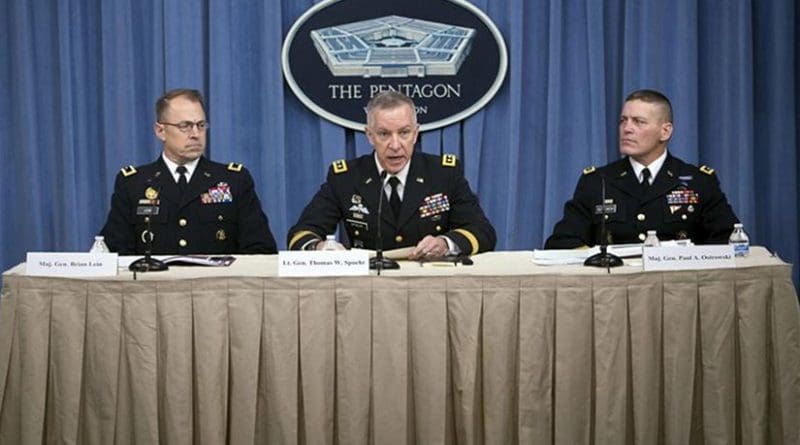Army Investigation Says US Public Never At Risk From ‘Mistaken’ Anthrax Shipments
By DoD News
By Jim Garamone
An extensive examination of the Army’s mistaken anthrax shipments found “no evidence to suggest in any way, shape or form, that lab technicians or the American public were at any time at risk,” the Army’s investigating official said during a Pentagon news conference today.
Army Maj. Gen. Paul A. Ostrowski, a Pentagon acquisition official appointed to head the investigation that began in July, said there was no single event, no individual, nor group directly responsible for the inadvertent shipment of active anthrax to labs around the world.
“We did find through evidence that a combination of events including gaps in science, institutional issues and personal accountability when taken together each contributed to this event,” he said.
The Army uses small amounts of anthrax to test U.S. equipment designed to detect or defeat biological organisms, said Army Lt. Gen. Thomas W. Spoehr, who commands the Army’s Biological Select Agents and Toxins Task Force.
Dugway Proving Ground, Utah, was the heart of the problem, the two generals said. The lab there sent more than 180 questionable samples to labs in all 50 states and nine countries.
Recommendations Benefit Program
Spoehr said his task force has made recommendations that will benefit the entire program, not just address the problems at Dugway.
The recommendations will be implemented as quickly as possible. The first recommendation is to establish a DoD executive agent, that will perform technical review, harmonization of procedures and integrate the inspections for this program. The Army Surgeon General Office has been named the executive agent.
“We will establish a standing DoD biological safety review panel, consisting of prominent scientists from both within and outside of the Department of Defense, and that review panel will review and validate procedures for working with biological select agents and toxins,” Spoehr said.
DoD will also put in place a process to screen and validate all requests for biological products from outside DoD to see if they are valid and to see if a less-dangerous product can be substituted for what has been requested, the general said.
Tracking, Monitoring
The department also will put in place a central process “to track and monitor all requests and transfers,” Spoehr said.
This, he added, includes a new information technology system not tied to the Dugway lab.
“We have – and are – in the process of developing new DoD procedures for the inactivation and testing of bacillus athracis, which, when the underlying scientific research is completed … will serve as our single DoD and Centers for Disease Control validated procedure for this procedure,” he said.
Control of the Dugway laboratory has been transferred from the Army Test and Evaluation Command to the Research, Development and Engineering Command, Spoehr said. This also eliminates the lab’s mission of producing biological agents for export.
“So that production mission will no longer be conducted at Dugway Proving Ground, it will be done at other laboratories within the DoD,” he said.
And, there will be one DoD inspection program teamed with the Centers for Disease Control rather than the eight teams previously.
“The totality of all these decisions will greatly improve the safety in this critically important program for both U.S. government workers and the American public,” the general said.

